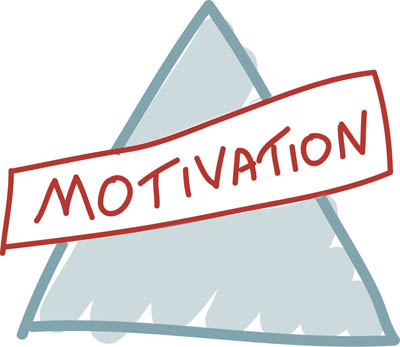Motivational Theory. As learners, where and how do we get the drive to move forwards? At this moment, one week into my Master’s residency, I feel highly motivated. I want to be here, I’m enjoying being here, and I want to be successful, for a number of reasons. Of course, over time, this feeling may change, as it does for all of us.
I have been thinking about motivation and comparing it to theories we discussed in class. Maslow’s hierarchy of needs makes a lot of sense, as do a number of other theories that Lisa presented. (By the way, who did Maslow have to pay to get so popular? Maslow this, Maslow that… enough already!) Out of all of them, I am particularly interested in MacClelland’s 3 need theory. The concept of putting needs across a spectrum and having the ‘middle’ of the chart represent the ideal is appealing to me—and seems to align to my own philosophical beliefs.
The other thought that comes to mind in studying motivation, is the idea of people being ‘motivated’ to participate in research, and by this I mean at the subject level. As we have been discussing using both surveys and interviews towards answering research questions, I am struck that we need study participants to be motivated to give their opinion. How is that possible when everyone already claims to be busy or overloaded, and nobody wants to get involved? When telephone pollsters call me, my standard line is, “I’m sorry, I don’t do surveys.” (This works, by the way, and I prefer it to just ‘hanging up’, which to me, always feels rude.)
But now, I am placed in the position of planning to do research to finish my degree. How am I going to motivate people to participate? And even more importantly, what methods of motivation won’t inadvertently skew the results?
Hi Ken,
The subject of bias is just so all encompassing. I am leaning towards the belief that much like a publication bias that exists, where positive results are more likely to be published than negative results, there is a built in bias among the participation of survey subjects. It is commonly stated that people who respond to customer satisfaction survey when they are very unhappy, or very pleased with the service. I think that a person willing to participate in any study brings with them their biases.
A really good example of this is research in the area of human sexuality. There’s a study in which two different recruitment methods were used volunteer and non-volunteer and both samples completed the same personality, sexuality, and social behavior questionnaires (Bogaert, 1996, p.125). The results were similar to what has been found in other studies on the same subject namely that volunteers report lower instances of sexual guilt, more sexually experienced and put less stock into social-conformity and following the rules than the non-volunteer group (Bogaert, 1996, pp.125-126). The self-selection capabilities of these studies creates a problem for researchers because of the volunteers motivation for participation. It stands to reason that someone who is more open or comfortable with sexuality may have both a higher level of experience, and they may feel more comfortable discussing sexuality.
I have a few other examples including one where researchers studying bisexuality concluded that it did not exist but the problem with the survey was the methodology they allowed participation in the study by allowing men who self-identified as bisexual to participate. When later researchers controlled for that bias by including interviews and sexual history as a part of the inclusion criteria they found different results.
So, it would seem that the best way to find participants is to seek out the group who is likely to be interested in the topic you are researching, but in that case you need to control for bias.
Reference:
Bogaert, A.F. 1996. Volunteer bias in human sexuality research: Evidence for both sexuality and personality differences in males. Archives of Sexual Behaviour, 25(2): 125–40.
well said!
That emoticon is great
I meant avatar
Ken,
I very much enjoyed your post. I share your enthusiasm for wanting to be here.
I also agree with your question as to how you are to try to motivate your study group. It’s funny how we are now going to endeavour to be those we often despise. I think we have come to the edge of the gang plank in regards to the over use of surveys for certain. I do think there is still room in the hearts of most people to help in true helpful surveys though. I think the ones we most get upset with are the marketing research ones trying to get us to tell them how we will part with our money easier.
I think you raise a very valid point, in motivating to answer are we being ethical, and are we skewing the results? That is a very good question and one in which I think needs to be further thought about in all our information and research gathering.
Comments are closed.